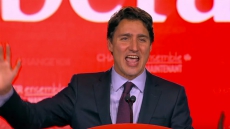TORONTO — Justin Trudeau is showing how dramatically the federal government's relationship with Ontario has changed, making his first meeting with a premier since last week's Liberal election victory in Kathleen Wynne's office.
Wynne campaigned frequently alongside Trudeau and other Liberal candidates in Ontario throughout the lengthy federal campaign, and was beaming the morning after the Oct. 19 election while she also tried to manage expectations by warning the two won't always agree on every issue.
But expectations are high that the leaders of Canada's two largest governments will see eye-to-eye Tuesday on a host of federal-provincial issues, including climate change, assisted suicide, prostitution and the legalization of marijuana — Wynne says it's time for a national conversation about pot.
The province is hoping for federal help with its signature $130 billion, 10-year plan for public transit and infrastructure projects, and with enhancing the Canada Pension Plan so Ontario won't have to implement its own provincial pension.
Wynne told The Canadian Press last week that ensuring people who don't already have a workplace pension get a more adequate retirement income from the CPP would be the topic of her first conversation with Trudeau.
But she also cautioned that the new federal-provincial relationship would not include a "ticking of boxes," and insisted she would not present the incoming prime minister with a list of Ontario demands in exchange for having helped deliver his new majority government.
The Liberals took 80 of Ontario's 121 seats, compared with 33 for the Conservatives and eight for the New Democrats.
Wynne launched a public campaign in 2015 to get a meeting with outgoing Prime Minister Stephen Harper after he had dismissed all requests for a get together with the premier for more than a year.
And during the election campaign, Harper boasted that he "delighted" in blocking any federal government help to create or administer the new Ontario Retirement Pension Plan, dismissing it as a "job killing payroll tax."
Wynne cautions that Trudeau alone can't agree to increase contributions and benefits under the CPP and needs the consent of other provinces, and said she will keep planning to start payroll deductions for the ORPP on Jan. 1, 2017.
Unusually, there will be no media availability by either Liberal leader after their meeting at the Ontario legislature, which comes one week after Trudeau led the third place party to a majority government, and just over a week before he will be sworn-in as prime minister.

